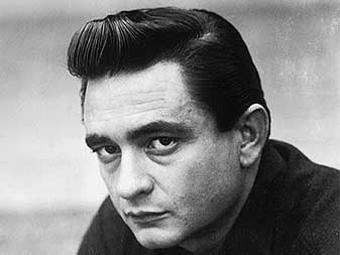Johnny Cash was born on February 26, 1932, in Kingsland, Arkansas, John, or J.R. as he was known to those close to him, spent the majority of the next 15 years out in the fields, working alongside his parents, brothers and sisters. It wasn’t always an easy life for Cash. At the age of 10 he was hauling water for a road gang and at 12 years old he was moving large sacks of cotton. From an early age Cash, who first picked up the guitar at the age of 12, showed a love for the music that enveloped his life.
Johnny Cash joined the Air Force in 1950 and trained in Texas where he met his first wife. After his service and discharge, he formed a band and landed a record deal. In 1967, he married June Carter.
On December 4, 1956, Elvis Presley dropped in on Phillips while Carl Perkins was in the studio cutting new tracks, with Jerry Lee Lewis backing him on piano. Cash was also in the studio and the four started an impromptu jam session.
Phillips left the tapes running and the recordings, almost half of which were gospel songs, survived and have since been released under the title Million Dollar Quartet. His best-known songs included “I Walk the Line”, “Folsom Prison Blues”, “Ring of Fire”, “Get Rhythm” and “Man in Black”.
Cash led a tumultuous life, battling drug addiction, chaffing against orthodoxy, and doing things his own way. But by the end The Man in Black became an icon, a man who earns almost universal respect among music fans.
Cash began a relationship with June Carter, who by 1967 helped him kick his drug habit and reconverted him to fundamentalist Christianity. By the time Cash and Carter married in early 1968, they had been working together regularly.
They had hit duets with “Jackson” (Number Two C&W, 1967), “Long-Legged Guitar Pickin’ Man” (Number Six C&W, 1967), and versions of Bob Dylan’s “It Ain’t Me, Babe”.
In 1970 Cash performed at the Nixon White House. He and June Carter travelled to Israel in 1971 to make a documentary, Gospel Road Cash continued to tour and make hits through the Seventies, including “A Thing Called Love” (Number Two C&W, 1972) and “One Piece at a Time” (Number One C&W, 1976).
He was invited to perform at the White House for the first time in 1972. President Richard Nixon’s office requested that he play “Okie from Muskogee” (a Merle Haggard song that scorned “hippies”, youthful marijuana users and war protesters) and “Welfare Cadillac” (a Guy Drake song that derides the integrity of welfare recipients).

Reportedly he refused to play either song because he found both songs morally reprehensible. By the late Eighties, his long streak of country hits had ended, and Cash complained to an interviewer that he’d been “purged” from Nashville, replaced by contemporary “hat acts.”
He continued to perform constantly, however, usually with a package tour that included his wife and her sisters Helen and Anita Carter, as well as Johnny and June’s son, John Carter Cash (other Cash and Carter siblings would sometimes show up too).
Throughout these years, Cash turned to acting; as the years went by he participated in a long parade of Western-themed movies and TV shows.
In 1980, Cash became the youngest person ever elected to the Country Music Hall of Fame. A year later, Cash found himself in Stuttgart, Germany, at the same time as old friends Carl Perkins and Jerry Lee Lewis. They went on stage together and recorded a live album titled The Survivors (1982).
On May 15, 2003, June Carter Cash died of complications from heart surgery. Almost four months later, on September 12, 2003, Johnny Cash died at Baptist Hospital in Nashville, Tennessee, from respiratory failure brought on by complications from diabetes one of the many physical ailments Cash had been facing over the years.